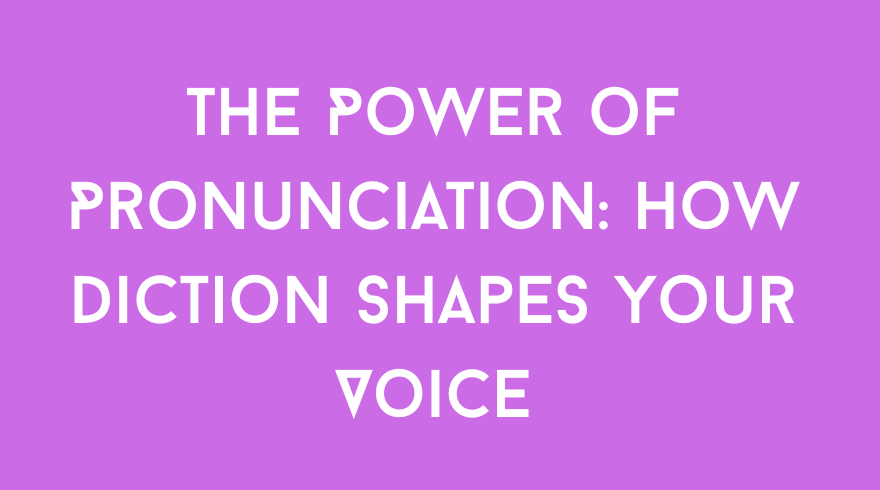Every singer wants their audience to connect deeply with their music, not just through melody but through words that carry emotion and meaning. The secret behind this lies in pronunciation and diction. Good pronunciation shapes how your voice sounds, while clear diction ensures that every lyric reaches your listeners with impact.
When you sing with precise pronunciation, your audience doesn’t just hear you, they feel your message. Diction transforms your singing from technical performance to genuine storytelling, allowing your voice to express confidence and artistry.
1. What Is Diction and Why It Matters
Diction is how you pronounce and articulate words while singing. It gives your performance clarity and helps your lyrics sound natural. Even the most beautiful melody can lose power if the audience cannot understand your words.
Clear diction allows your sound to flow smoothly and keeps your message strong. It also affects your vocal tone since better articulation leads to cleaner resonance and a more polished sound overall.
2. How Pronunciation Shapes Tone and Expression
Pronunciation is more than just saying words correctly; it’s how you give life to every lyric. Good pronunciation allows your tone to stay balanced and expressive. When your mouth and tongue move freely, your tone becomes fuller and more controlled.
Every vowel and consonant you shape adds texture to your sound. A singer with strong pronunciation skills can shift easily between emotional softness and powerful projection without losing clarity or control. It’s this skill that makes professional singers stand out because their words always sound intentional and emotionally alive.
3. Developing Better Pronunciation Through Practice
Improving pronunciation takes consistency and awareness. Start by listening carefully to how professional singers articulate their lyrics. Notice how each word is shaped and carried through their tone.
Practice slow singing exercises where you focus on one line at a time. Pronounce every syllable clearly before increasing speed. Recording yourself is also an excellent way to identify unclear words or sounds.
You can also include tongue and jaw relaxation exercises to make your pronunciation smoother. The more relaxed and flexible your mouth muscles are, the easier it is to sing with clarity and precision.
4. Essential Exercises to Strengthen Your Diction
Here are some practical exercises to make your diction stronger and more natural:
- Tongue twisters: Practice sentences like “Red leather, yellow leather” or “She sells seashells by the seashore.”
- Vowel shaping: Sing through open vowels (A, E, I, O, U) slowly, ensuring smooth transitions.
- Consonant control: Emphasize the endings of words to avoid slurring.
- Mirror practice: Watch your mouth movement to maintain natural articulation.
Performing these drills regularly helps your speech organs work in sync with your breath, improving both pronunciation and tone quality.
5. Diction for Different Singing Styles
Not every style of music demands the same level of diction. In classical or musical theatre singing, clear enunciation is essential to storytelling. In pop and R&B, diction tends to be more relaxed, allowing for a natural conversational flow.
Adapt your pronunciation based on the emotion and energy of the song. The key is to remain understandable without sounding forced. Good singers maintain clarity without sacrificing feeling or rhythm.
6. Common Pronunciation Mistakes Singers Make
Even experienced vocalists can make pronunciation mistakes that reduce clarity. Here are a few to watch for:
- Singing with a tight jaw or tongue tension
- Dropping word endings, especially in fast lyrics
- Overpronouncing vowels, which can sound unnatural
- Ignoring breath control, which affects both tone and diction
Fixing these habits requires patience and self-awareness, but the payoff is worth it. Your voice will sound more natural, expressive, and confident.
7. How Strong Pronunciation Builds Confidence
When you master pronunciation and diction, you gain more control over your performance. You’ll no longer worry about mumbling or unclear words. Instead, you can focus entirely on expression and connection.
Good pronunciation not only improves vocal clarity but also boosts confidence. Every lyric becomes intentional, and your audience will hear the message exactly as you mean it.
Conclusion
Your pronunciation is the bridge between your voice and your listener’s heart. By developing stronger pronunciation skills, you’ll refine your tone, clarity, and emotional delivery while keeping your sound natural and authentic.
Diction and pronunciation together define your vocal identity. Practice consistently, stay aware of your articulation, and soon your singing will carry both precision and passion, leaving a lasting impression on every audience.
